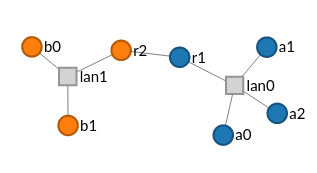Network Emulation
This example shows how to set up network emulation in your experiment. In the topology depicted below, there are 2 enclaves distinguished by color. Each enclave is locally interconnected through an emulated multipoint link, and the connection between enclaves is an emulated point to point link.

Emulation characteristics enter the model via capacity and latency constraints
that are placed on links when they are created. These constraints are imported
from the mergexp.net library.
Link constraints are applied in the same way to point to point and multipoint links.
Latency
The behavior of latency round trip. So if you specify a latency of 10 milliseconds on a point to point link the delay will be 5 milliseconds in each direction.
Capacity
Capacity constraints are full-duplex. So if you specify a capacity of 100 mbps, the link will have that capacity in each direction.
Dynamic Link Modification
Link parameters can be dynamically changed during the experiment lifetime
through the use of the moacmd user tool on an XDC attached to the experiment.
note
In order to be able to change a link's parameters, the link must have
one or more tags applied to in the topology model so that the user can specify
which link is to be changed via moacmd. This is demonstrated in the full example
below.
Usage
- tag is the set of links with the specified tag applied in the XIR
- param is the link parameter to change (currently allowed:
bandwidth,delay,loss) - value is the value of param
This will set the parameter defined by param to the value of value on all links tagged with tag in the XIR.
Delay
In the example below the latency between the two routers could be changed to 47 milliseconds follows.
Bandwidth
Setting bandwidth to 47 megabits per second
Loss
Setting loss rate to 4.7 percent
The following unit suffixes may be used
| unit | suffix |
|---|---|
| delay | ns, us, ms, s |
| bandwidth | bps, kbps, mbps, gbps |